What's the Healthiest Way to Eat an Entire Cake?
Chris is joined by Giles Yeo, Roger Buckley, Andrew Pontzen and Kerstin Goepfrich, and they enjoy a mince pie or two while answering listener questions, including: why isn't love blinding; are glasses or contacts better for your eyes and what would happen if you brought a thimble of neutron star to earth? Plus, the team discuss the supposed benefits of the Mediterranean diet and debate the worst science movie mistakes.
In this episode
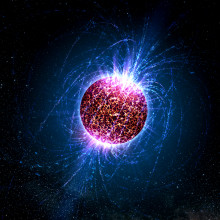
What would happen to a thimble full of a neutron star if you brought it to Earth?
Physicist Andrew Pontzen pontificated about Jane's question...
Andrew - Well, it's not advisable to bring a thimble full of neutron star here. Neutron stars are a gift really, they are just the weirdest things out there in space, or amongst the weirdest things.
Something like two times the mass of our own Sun and yet it's concentrated into a tiny, tiny region about twenty kilometres across and, for comparison, the size of the Sun itself is more like a million kilometers across. So you're cramming a huge amount of stuff into a tiny amount of space almost getting towards black hole type proportions.
Chris - And why are they called neutron stars?
Andrew - They're called neutron stars because when you do that, the thing that actually happens is that you cram all of the electrons, which are the negatively charged particles, into the protons. And that actually turns them into neutrons because you combine negatively and positively charged particles and you end up with only neutrons left over.
That, in fact, is part of the reason why you would never want to take a thimble full of this material here to Earth, a number of things would happen. First of all to get that much stuff in that small a space you need to compress it down and that's held together by the immense gravity on a neutron star. But if you take just a thimble full of it, that gravity's gone and, essentially, this thing is just going to spring apart really fast. And you're talking about a Mount Everest or perhaps several Mount Everest's worth.
Chris - From one thimble full?
Andrew - From one thimble full which is why we always talk about the thimble fulls of course because it's a great statistic, an entire Mount Everest packed into a thimble. But it's going to try and spring apart to be the size of Mount Everest, so that's not great to start with.
But, even worse than that, even if you survived that happening, then you have all of these neutrons, and neutrons on their own are not actually stable particles. They're going to try and decay back down to the protons and electrons, which most of them were formed from in the first place and that process of nuclear decay is not pretty either. It's going to release a huge amount of energy. I tried doing a bit of an estimate of this, it does depend a bit on the exact assumptions you make, but I think it's something like one trillion H bomb explosions. That much energy is going to be released over the space of a few minutes as all of these neutrons turn back into protons and electrons.
Chris - That could give even a photon torpedo a run for it's money, couldn't it, in Start Trek?
Andrew - It certainly could. And, if you bear in mind that's a sort of factor of ten, no even bigger than that, it's probably a factor of ten thousand times more energy than was involved in the collision with the asteroid that we think killed the dinosaurs, you get the sense of just the enormous amounts of energy that would be released by doing this. So, please, please, please, don't do it!

Should I eat cake all at once or spread out over several days?
Luckily for Kane, Giles Yeo is in the know...
Giles - So this is obviously the Christmas question, right? I think we've got to think about...all calories are equal from a physics point of view. I know I'm surround by physicists but, from a physics point of view, the problem is how you get at each of those different calories. If you actually eat all of a pack of Oreos or something like that in one go, the chances of you having the chance to try and burn it off is, obviously, small in one day.
Whereas if you divide that exact same pack of Oreos, assuming you don't eat a pack of Oreos every day, of course, and divide it out over seven days then you have a greater chance of burning that bulk of energy off. So it doesn't make a difference if you access all the calories, but it does make a difference because you obviously have more chance to burn it off.
Chris - Kerstin.
Kerstin - Is it true that the time of the day when you eat it matters at all?
Giles - Yes, that actually is going to be true as well. Because, as you know, we evolved in day and night and the thing about being alive is our brain actually tries to predict the things that are going to happen including when you're likely to eat and when you're likely not to eat. And because we have evolved with no electric lights, to actually eat when it's light and sleep when it's dark, we are most metabolically active in the daytime rather than at nighttime. So, like I said, all calories are equal but clearly you're going to be burning slightly more of it if you're more metabolically active.
Chris - Would you absorb all of the calories - if I did eat an entire packet of biscuits in one go are they all going to get absorbed or is my gut going to say I just can't cope with all of that and, assuming I don't throw up, is it just going to waste some of those calories?
Giles - Mmm. No I think it you're eating something like a chocolate biscuits, which is going to be highly refined on carbohydrates you are going to absorb it all, and the stuff that you don't burn immediately is going to be converted to fat.
Chris - So don't do that then.
Giles - Christmas comes but once a year!
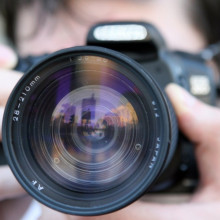
How many megapixels is my eye?
Roger - Well, the first thing to say here is that the human eye and the camera see things very differently. The eyes got about 160 million rods and cones, which are the light sensitive elements in the retina but they're not spread evenly and the central part of the retina, which is known as the 'macula,' which is the bit we look with when we're looking at something and we want to see something as clearly as possible. Here the cones are packed in very tightly and they give the eye it's best resolving power, and they also provide it with colour vision. This area of very accurate sight only accounts for about two degrees of our whole visual field.
Andrew - It's kind of interesting, if I understand what you're saying correctly, that at the resolution of our eyes is tailing off into our peripheral vision and yet the experience of looking at things, I don't really feel like everything's sort of fuzzy on the edges of my vision, I feel like I can just see things. So how do those things fit together?
Roger - Well that's because you've always seen like that.
Chris - We don't know any better.
Roger - But the digital camera doesn't have any of that sophistication. It sees equally sharply at every point on the sensor or the film, whichever it may be, the periphery and the centre. If it were to see as well as we see with our macular vision, our central vision, we wouldn't be talking about millions of pixels, we'd be talking about billions of pixels.
Chris - Giles.
Giles - You know our eyes are always scanning so when we're actually looking we're only looking at a very, very, tiny portion of it. So what we're actually seeing is really a result of our eyes scanning the entire time.
Roger - You're absolutely right. We're scanning all the time and the brain is filtering out the scanning so everything appears to be still. And more than that, we can actually see in three dimensions because we happen to have a pair of eyes at the front of our heads, looking forward and getting two slightly different images which the brain, once again, can compare, put together, and allow us to appreciate distance and depth. In other words, see in 3D.
Chris - I suppose the main consideration here is that when you take a digital picture, that is literally a snapshot in time. Whereas our eyes, there's about a million nerve fibres in each optic nerve feeding a train of information in through a series of relay stations and onto the back of the brain where we decode what we see.
And, actually, there's an enormous amount of processing going on in what's being fed to our consciousness that we are totally unaware of, and so the visual world we live in is a complete creation, complete artifice made up for us by the way our brain works. And what I call for instance blue, may not be what Kirsten calls blue or red at all, it's just someone's told me that this neurological experience that I call blue happens to look blue to me, but that might be seen by Kirsten's brain as a completely different experience. But we can't compare, we can never find out.

Is it possible to slow light down?
We asked physicist Kerstin Goepfrich if light can ever be slowed down...
Kerstin - Well, light travels at the speed of about 7.5 times around the Earth in just a second. That's really very fast and that is the speed at which light travels.
Why? Well light is made of a unit of energy called the photon. And the photon has energy, it has a momentum but it doesn't have mass, and physics tells us that an object without mass travels at the speed of light. So that's true for a photon and that's also true for gravitational waves, for instance.
But it can take longer for light to travel a given distance. So how can that be if it always travels at the speed of light? Well, in simplified picture, you can imagine that light that's travelling at the speed of light, hits an atom where it gets absorbed, then it takes a while for it to get re-emitted, then it travels at the speed of light again until it hits the next atom, and so on and so forth. That is why it can take light longer to travel through a medium like water, for instance as opposed to travelling through a vacuum.
Chris - Because it does physically slow down when it goes from one medium into a more optically dense medium, doesn't it, like glass, like water?
Kerstin - And when you say optically dense, that is exactly what a refractive index means. The factor by which light slows down, when it for instance goes through water, is the factor which we call refractive index so, for instance water has a refractive index of 1.3, which means the light is 1.3 times faster when it travels through a vacuum compared to water.
Chris - So the bottom line is that you can slow light down and it does, all the time, speed up and slow down when it goes from one medium into another medium. That's why it bends and refracts and that's why, when you look over your toaster at the wall behind your toaster when you're making your toast in the morning, the wall looks wavy and wiggly because the light is bouncing off the wall and speeding, up slowing down and bending.
Kerstin - Even though it is still travelling at the speed of light. And if you want to measure that there is actually a simple experiment that you can do with your Christmas chocolate if you've got some left over. You put it into the microwave because microwaves are also travelling at the speed of light, and you know the frequency at which your microwave operates, you can look at the two points where your chocolate melts and measure the distance between them. If you google microwave and speed of light then you'll probably find the details and instructions on how to do it.
Chris - In fact, you could go to nakedscientists.com/kitchenscience because we have put there the worked experiment of how you measure the speed of light with your microwave. And we did by buttering lots of bread and melting patches of butter and because the wavelength of a microwave and an oven is about twelve and a half centimeters or so. So you get melting every time there's a peak or trough on the wave so that's every six centimetres, so you can actually work out the speed of light because c speed of light = f the frequency x lambda the wavelength. And you can look on the back of the microwave and it will tell you the frequency of the microwave is 2.45GHz.
Giles - Well this sounds like a lot more fun than playing with a puzzle after you've finished you turkey. I think this sounds like we should have that in our Christmas dinner this year.
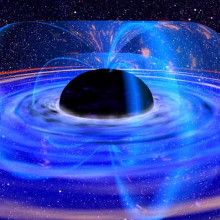
Will black holes ever become stars again?
We put Alan's question to cosmologist Andrew Pontzen... Andrew - Hawking radiation is really one of these breakthroughs. It happened in the mid 1970s named after Stephen Hawking, of course, and it was a breakthrough in our understanding of the Universe. Because according to Einstein's famous theory of general relativity, which is our best understanding of the way that gravity works, it's possible to cram so much stuff into such a tiny space that nothing can get out at all from that region of space. It's just trapped in there by the sheer strength of gravity and that's what we call a black hole.
What Hawking radiation is all about is showing that actually, when you combine that theory of general relativity with the other major theory of the twentieth century which is quantum mechanics, which is all about the way that very tiny bits of matter behave in the universe, you get a really remarkable result. Which is that, actually, very, very slowly things can trickle back out of a black hole, and we call that trickle of stuff coming back out of a black hole Hawking radiation.
So with this question saying, can a black hole start shining? In a sense, what Hawking radiation is saying is it already is shining, it's just shining so very, very faintly that we can't really see it. But one of the interesting predictions of Hawking radiation is the rate at which stuff drifts back out of black hole. In other words the rate at which it's shining, increases as a black hole gets less massive. So you can imagine what happens is, if you leave black hole for long enough, very slowly there's this trickle of stuff coming out so slowly it's losing it's mass is just seeping away into the Universe. So it get's smaller and smaller and, as the black hole gets smaller and smaller of course, the brightness, the rate at which all of this stuff is coming out is going up. And so, actually, it gets brighter, and brighter as time goes on.
Now for this to really happen, you need to leave the black hole well alone. If you just chuck a bit of extra stuff in the black hole, of course you'll easily cancel this out. So you need to take a black hole, isolate it for many, many times the age of the Universe, in fact, something like ten to the fifty-three times the age of the Universe.
Chris - It's not going to happen any time soon then?
Andrew - It's not happening any time soon. Then eventually, you will see it. You will see it literally light up and at the last 0.1 seconds of it's life it will actually pretty much explode. Because this process of stuff leaking out and generating energy becomes so efficient it explodes with something like a million H bombs. We're measuring everything in H bombs today. It will be something like a million H bombs..
Chris - Only a million. So the Neutron star thimble can knock this into next week then?
Andrew - That's absolutely right. In astronomical terms this is a tiny, tiny amount of energy but still, it's a million H bombs in the last tenth of a second in the life of a black hole.
Chris - Thank you Andrew. Ed Wilson on twitter @nakedscientists has tweeted in. He's actually thinking about the practicalities of, going back to the Neutron star, of getting the thimble full of said Neutron star material to Earth. And says, well that's going to take a huge amount of energy in and of itself, so that's another tricky aspect of that.
Andrew - Yeah. And you would also need to make a very, very, well reinforced thimble. You go and scoop this thing up and then somehow you actually have to keep it together until you get it to Earth in order to destroy the Earth. It would be the worst Bond movie ever.
Chris - Kerstin.
Kerstin - I was wondering, can you actually measure this? Do we have any chance of observing the black holes radiating?
Andrew - It would be extremely hard to observe an actual black hole radiating for the reason that real black hole in the Universe, and they do exist, but the real ones tend to be surrounded by gas, and dust, and stars, and things that will be putting out radiation much, much, much faster than this tiny trickle. But, people are trying to create in a laboratory sort of analogues to black holes where they make very, very small systems which behave in a very similar way to black holes and, in that context, people have actually seen this behaviour.
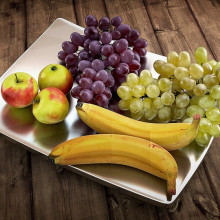
Which foods are actually good for you?
We put Dirk's question to geneticist Giles Yeo...
Giles - I think all foods are good for you at the right amount is the most unfashionable answer in all the world.
Chris - That right amount be zero.
Giles - That right amount.
Chris - In the case of some junk food I think.
Giles - Very little of it is going to actually be zero. I think you can probably get a little bit of.
Chris - Cyanide's not very good for you is it, you must be honest?
Giles - No, that's true, that's true.
Chris - No neutron stars either. You probably wouldn't want one of those.
Giles - Clearly. But stuff that's not going to kill you. Everything is good for you at the right amount. So I think the question probably is: if we consider good food as something you can eat as much of as possible without it killing you, if we go as that as good food. I think a lot of fruit are clearly going to be good for you. Stuff in a mediterranean diet, so foods that are actually eaten.
Chris - Isn't that classed as World Heritage UNESCO recognised as a phenomenon - the mediterranean diet, isn't it, I think?
Giles - Do you know what? A lot of things I had heard was anecdotal previously until I sat at a meeting just a couple of weeks ago and I saw some really compelling data about the benefits of a mediterranean diet. This was a study, which I saw in Spain, so this is the caveat, it was actually done in Spain, so people tend to have a mediterranean diet.
Chris - There are some quite good scientists in Spain?
Giles - No, no. But they tend to eat a mediterranean diet anyway. Now a mediterranean diet just for people out there, our stuff is going to be high in whole grains, a lot of extra virgin olive oil, fish, lower in dairy products and lower in meat. Okay, so kind of like a typically Spanish type of meal. And if you actually compare that, so they took people who were at risk of dying of heart attack and getting type 2 diabetes so obese people between 50 and 75. Put a few thousand of them on a mediterranean diet and put a few thousand of them on an American Heart Foundation low fat diet, just all the way across the board. And people on the mediterranean diet who were not restricting their food intake did better. The caveat is that it's in Spain. I don't know how applicable it can be in Texas or, for that matter, in Cambridgeshire, where fish is nearly impossible to get, but the mediterranean diet seems to be good for you.
Chris - So you would say rather than going for one food stuff specifically and in particular and exclusively, actually, the real good for you food stuff is the mixed diet that the mediterranean diet represents?
Giles - Undoubtedly. I think it's stuff which just takes a little longer to digest, high in polyunsaturated fats, that's what you really, really need. So not single, individual food groups.
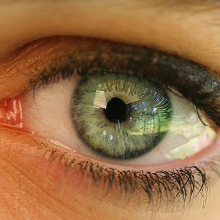
Glasses, or contact lenses: which are better for your eyes?
Eagle-eyed expert Roger Buckley had the answer to Korochkina's question... Roger - Well short-sighted people usually see better with contact lenses than with glasses and the reason is that there's no frame in the way. If you have an occupation which requires use of optical instruments like a microscope, in my case the operating microscope for example, it's much easier to get close to where you need to be if you're wearing contact lenses rather than glasses. And the other thing is, if you're short-sighted, the contact lenses will produce a slightly larger image on the retina so you will actually see better.
But against that, you have to bear in mind that glasses never did any eye any damage, whereas contact lenses can. The can cause infection, particularly if they're worn overnight. You're twenty times more likely to develop a corneal infection if you wear your lenses overnight than if you take them out every day.
Chris - Now if I go around struggling and I don't correct my vision because of vanity or whatever reason, are there any consequences apart from obviously walking into walls and having car accidents?
Roger - Yeah. Those are the main ones probably. We're talking about now in adults, in children it may be different. There may be reasons why children have got to wear glasses to correct their sight but in adults with their sight established, you're not going to damage your eyes if you don't wear your glasses. You could wear an out of date prescription, you could even wear someone else's glasses. You wouldn't see very well but it's not going to cause any damage.
Chris - Giles has just waved his hand. Are you wearing someone else's glasses?
Giles - I'm not wearing because of vanity. Because of how I look I don't wear glasses. But my question is: short-sightedness - is it reversible at all without laser surgery I mean? Does it go away or once you've established your eyesight, that's what it is?
Roger - Yes, in a word. It's all to do with the shape of the cornea but, more usually, with the total length of the eyeball. If the eyeball is too long you're short-sighted and there's nothing you can do to shorten it.
Chris - It's because the light is falling in front of the retina rather than on the retina and then it's passing through it's focal point and spreading out again, so you get a blurred image. You're not seeing spots of light you're seeing bigger blobs of light so things look blurry.
Roger - Exactly right.
Chris - Where do you stand on this whole idea of reading in the dark because people used to say to me when I was a kiddie - Oh don't read in the dark in poor light, you'll strain your eyes. Is that true?
Roger - I don't think there's any real evidence of that. The only thing I would say that the modern lifestyle which involves reading and using tablets, and telephones, and gadgets, is producing a race of short-sighted people. It's an epidemic. We don't go out and play games in the open air. We watch television, we work close too, if you see children walking in the street they're very often their nose is almost on the telephone or the pad, whatever it may be. And this is causing them to accommodate grossly, much more than is necessary.
Chris - Adapt their vision for close work?
Roger - Yes. Chris - Giles.
Giles - I didn't know this. In other words during development obviously you have brain plasticity, you know how everything is actually wiring themselves up, this is also true for your eyesight? You need to develop your eyesight to actually get to twenty-twenty, six-six vision? Roger - Yeah. The visual system when a child is born is really quite primitive, but also the eye is small, it's got to grow. What you don't want it to do is to grow too much, become too long and, therefore, short-sighted. So this is why it's better for children to be outside playing, kicking a football around, than it is to be concentrating on something just a few inches from their nose.
Chris - And last one Roger, very quickly. Laser surgery, where do you stand on that?
Roger - I think if the cases are very carefully chosen by experts, it can be very useful and it does have certain medical uses. For example, if one is very different from the other they can be evened out. But for purely cosmetic purposes, I have my doubts.
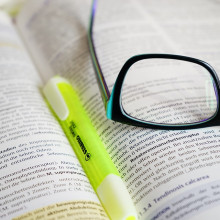
If you need glasses but don't wear them, will your eyesight get worse?
Roger Buckley had the answer to Kalind's question...

What size solar panel to charge a smart phone?
We asked Kerstin Goepfrich how big a solar panel would have to be to charge a phone... Kersten - Well I guess this depends on where you are. I brought with me my phone charger because I think we can assume we want to charge our phone as fast as we can do. With this thing which plugs into the socket on a wall. So Chris, can you read off the output - it says on here which power output this can give us?
Chris - I reckon I need glasses or laser surgery or something to see. Oh dear, it's really indistinct. It's 1500 milliamp at 5 volt DC. And I almost needed the Hubble space telescope to see that. It's nearly as small as Georgia Mill's mince pie that we got before the programme!
Kerstin - 5 volt / 1.5 amp, if you multiply the two values that gives you the power output, which is 7.5 watts. So if we want a solar cell to produce 7.5 watts, how large would it have to be? Well, the best solar panels that have been made on a sort of laboratory scale had efficiencies up to 46 percent, so that's pretty good. However, the ones you would put on your roof, they typically have efficiencies of about 15 percent. So what does that mean? 15 percent of the energy that comes from the Sun is actually converted into electricity and in the areas of Northern Europe, we can assume that about 1,000 watts per square metre of sunlight hit the Earth. So, 1,000 watts per square metre, 15 percent, that means 150 watts per square metre.
So, we don't quite need 150 watts to charge a smartphone. We said we'd need 7.5 watts, that means we don't need a full square metre to charge our phone, but about the size of an A4 paper would be enough.
Chris - There you go. So that seems eminently doable. Andrew...
Andrew - Although, presumably, that would be at midday in full sun. When it's cloudy or dusk or something you're.
Chris - What about at nighttime?
Kerstin - You've exactly got the point there. I mean, there's not always sun. About 1,500 hours of sunshine is what we get here in the UK, for instance, out of 8,000 hours. So, yes, that's assuming perfect conditions so it might not be as practical. However, if you want to make this last vital phone call, it would save your day. There are these gadgets out there if you're still looking for Christmas presents.
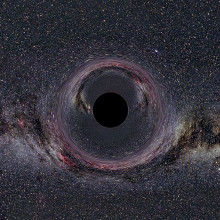
Where does matter in a black hole go?
Andrew Pontzen was on hand to answer Paul's cosmic question...
Andrew - Yes, absolutely. Black holes do suck in matter; anything that's unlucky enough to fall into the grips of a black hole is never seen again. And, honestly, we don't quite know the answer because black holes are still very mysterious things. If you take Einstein's theory of general relativity, which we were discussing a bit earlier on, the best theory of gravity we have. If you take that totally at face value, what happens to that stuff after it falls in is it keeps falling down, and down, and down, into a central point where it literally gets crushed into a single point. A mathematical point or a singularity.
However, that doesn't really make sense. We don't really believe that you can crush something that had originally had some extent and some normal piece of matter down to literally a single point. And what we think is really going on at some point, at quantum mechanics, which is the theory of how very small things work, has to come into play. Now as we were mentioning earlier on in this programme, we do have some ideas about how to combine quantum mechanics and general relativity, and it leads to predictions like Hawking radiation that very slowly actually mass finds it way out of a black hole but we don't really understand the details. When we try and drill down and understand how does the stuff that fell in find it's way out of a black hole, could you trace an individual bit of stuff into a black hole and then out. It's much more murky.
Chris - Giles.
Giles - You know you say it's unlikely a singularity exists as one might imagine it, then what actually happened. Maybe this is too big a question, before the Big Bang. I mean just before the big bang happened wasn't everything sat in one spot somewhere?
Andrew - Well again, the honest answer is we don't know. There's a lot of we don't knows in cosmology, although there are a lot of ideas. And one of the prevailing ideas at the moment is that the Big Bang as well, in the way that we think of it as everything sor of exploding out from a point, which again, is a prediction that's coming from Einstein's theory of general relativity. We now think that probably never really happened. Something very much like it happened but it wasn't quite that picture of everything was a point. We have ideas like inflation, which replace that idea with something very different.
Chris - George Osborne had something to say about that...
Andrew - Yeah, yeah. We always seem to be borrowing names from other things in real life which doesn't help. But inflation is an idea about the very early universe. The first tiny fraction of a second of the universe's existence and it replace the idea of an actual singularity of things exploding out from a point with a process that we can actually understand and make calculations about. In much the same way that we now think a black hole doesn't really have an infinitely dense point at it's centre.

Why do we get tired after eating?
Giles Yeo crunched down on Pius' question... Giles - Ah, that's an interesting question. I think what a lot of people think is as you're eating all the blood rushes from your head to your stomach in order to begin the digestion process.
Chris - You speak for yourself, Giles.
Giles - That's a myth. So the reason why you get tired after, that's not a myth, that actually does happen. It's not because of blood rushing from all parts of you body to your stomach. But I think the best way we can understand it is when you have a large mass of food within you gut and gastrointestinal tract, it turns on something called the 'parasympathetic nervous system.' So there is a nervous system which when you smack your face - ouch! - that kind of nervous system, but the autonomic nervous system which govern your unconscious bits of the things that happen.
Now there are two portions to that. There's the sympathetic nervous system the 'fight or flight' syndrome and there is the parasympathetic system which is actually the 'feed or breed' take a chill pill, sit down and slow down.
Chris - I heard it called 'rest and digest.' I hadn't heard it called 'feed or breed,' that's a new one on me but I like it.
Giles - So what happens is, as far as we understand it, this large mass of food, postprandially, after you eat, tilts your autonomic nervous system towards the parasympathetic so, therefore, causing you to feel tired. Now the reasons why, like once again we don't actually now, but evolutionarily you can imagine you need some time to sit and actually digest stuff before you can actually get up and run again. I don't know but that's probably the reason why.

What foods are good for your eyes?
We put Ellen's question to Roger Buckley... Roger - Well Giles was talking about the mediterranean diet and I think that would be a good start. What you need actually, is not any fatty diet or unusual diet, but a good balanced diet. And the story of the mediterranean diet goes back for many years. It was very recently, as recently as last month, shown in a scientific study of 5 thousand people that it does protect against macular degeneration, which is a very common cause of loss of clear vision in elderly people.
Chris - What actually is that for people who are not in the know - what is macular degeneration?
Roger - We were talking earlier about the centre of the retina, a very small area which gives the most precise vision and the colour vision, and that's the area which is vulnerable for various reasons. There are different types of macular degeneration but, on the whole, the tend to fate old people. We live in an ageing society and this condition becomes commoner as time goes by.
It doesn't blind you but it does mean you can't see clearly. You can certainly get about but you wouldn't, for example, be able to recognise faces across the road or read a newspaper, except the headlines.
Chris - And so, apart from eating a mediterranean diet from an early stage in your life because that's what your answer presupposes that I've been doing that for a nice long time and I don't get macular degeneration in the first place?
Roger - Yes.
Chris - If I know I've got something like happening, is it too late - is there anything I can do to start eating something that will stop that happening or is there nothing just apart from eating healthily?
Roger - Well, there is the five a day rule, which was introduced some time ago, and that is, actually, a little portion of the mediterranean diet, so that's keeping it quite simple. It is shown also in cataracts, that's something that also affects old people, that there are certain vitamins that may be helpful. For example, vitamin C and E and the carotenoids which includes lutein and zeaxanthin, and they occur in dark green leafy vegetables. And so, one would certainly encourage that.
There are certain things that would be discouraged in macular degeneration and the number one probably is smoking.

Is the idea that saturated fat and cholesterol are bad for you a myth?
We asked Giles Yeo about whether saturated fats really are so bad for us... Giles - You know what - it depends on who you are. If your genetics allows you, and there are some people out there who are lucky enough to be able to eat as many eggs as they want, as much cholesterol as they want and actually have no damage to them at all, then it is no harm to you at all.
Saturated fats, depending once again your genetics. Having too much of it will always make you fat, but if susceptible to damage from it, for cardiovascular reasons and other reasons, then it is going to be bad for you.
This is against a background of people saying, well fat is actually great for you now you should be giving up sugar. At some point, fat was very bad for you, sugar's good for you. You've got to eat enough of everything.
Chris - I think one other point to bear in mind that was an epiphany to me is that actually your body makes cholesterol in it's own cells. It needs it because it's very important for the integrity of the membranes in our cells. If you don't actually eat cholesterol, you will just make more in your cells and, therefore, cutting out cholesterol isn't going to make any difference really to your health. It's the saturated fat that then affects how much cholesterol and other lipids are in your bloodstream because you absorb the fat and then distribute it round your body in your bloodstream.
Giles - Exactly. So it's going to be down to your biology and how you actually handle that. If you're able to sustain that kind of diet then you're going to be fine, if not then you're not going to be fine.
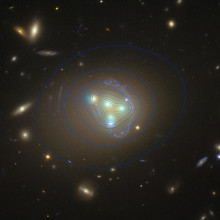
Because we have no dark matter planet in our solar system, can we assume that dark matter is not sticking to itself?
We put Donald's question to Andrew Pontzen... Andrew - Well very quickly the answer is yes. Dark matter is this extra stuff that we seem to need to make sense of the universe when we look at the way that galaxies, which are collections of hundreds of billions of stars. When we look at the way that they behave and, in particular, the way that they're spinning around and things are moving within them, we can see quite clearly that they're spinning too fast to be consistent with their only being made out of the stars we can actually see. And what we think is going on is the gravity that actually causes gravity to spin is being given an extra boost, if you like, by having some extra stuff there that we can't see directly. And that's the stuff we call dark matter.
At that level, of course, it's a bit made up. It's a sort of made up solution to a problem. But then we run with that idea and come up with a whole load of predictions for other things in the universe which then turn out to be correct. So this idea of dark matter does seem to be onto something. On the other hand, we've never been able to really figure out what it is. Nobody has found a bit of dark matter in a laboratory. That's probably to be expected because it seems to be invisible, but that means that it's properties - is it sticky for instance? It's stuff that we don't really know the answer to and we need to start thinking about exactly those kind of questions.
Chris - Kerstin.
Kerstin - What do you think, will we soon know, are we going to find dark matter at any point?
Andrew - Well, that is a very big question. I think eventually we will find it. But I think right now the prospects for finding it in the near future might not be as great as some people would like to think. And so we do need to look out into the universe to figure out what are its properties, what should we be really looking for? So this kind of argument where you say there aren't planets made out of dark matter therefore it can't be sticky is a godsend, it really is, because we can start to understand what is making dark matter tick.

How do we know meteorites are from Mars?
We asked Kerstin Goepfrich Mike's burning question...
Kerstin - Yes, we do actually have meteorites here from Mars, even though it is only a small fraction of the meteorites we find on Earth. We've found about 60 thousand meteorites and only just over a hundred of them have come from Mars. And we know they have come from Mars because we have Mars rovers which collected samples from the atmosphere from Mars, and these gases, they have been found enclosed in the meteorites we have found here on Earth. And they can escape the gravity of Mars by being hit by an asteroid that sort of knocks out a meteorite from Mars.
Chris - So something big slams into Mars, ejects material off the surface of Mars, which happens to have trapped in it tiny bubbles of martian atmosphere. Delivers the meteorite over time to Earth and, obviously, because we've got these rovers out there and we know what the Mars atmosphere is made of we can compare the two and say that must have come from Mars?
Kirsten - Precisely.
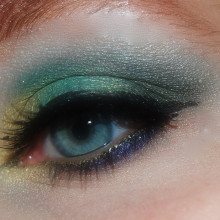
What kind of damage can a mascara brush do?
We put Brooke's question to Roger Buckley...
Roger - Well, a mascara brush can be harmful in two different ways. First a slip with the brush when the mascara is being applied can cause a scratch on the surface of the eye - either the white of the eye or the cornea. And whereas that will normally heal very quickly, within 24 hours, it could become infected and then that would become an emergency and require urgent treatment.
The other way in which mascara may be harmful, or the brush may be harmful is that it may actually be infected. When you apply it first to the skin, bacteria will adhere to it and when it's then put back into the container, they will not only survive but they will grow. This was established about forty years ago by some American workers. So, in effect, every time you apply that mascara brush to your lashes, you are reinfecting yourself with your own bacteria.
Chris - But if they're your own bacteria already, is that bad?
Roger - Yes, but they have increased in number in the meantime in the container, so you're putting on a larger concentration of bacteria. And there's an association with the use of mascara with infections of the eyelids. Blepharitis, styes and so on are commoner in people who use mascara.
Kerstin - Is it worse if I share my mascara with my best friend then?
Roger - Well, you don't know where your best friends been, do you? You wouldn't share contact lenses and, for the same reason, you wouldn't share mascara brushes I suggest. It's just not healthy.

Can I drink red wine?
Giles has some good news for any (moderate) red wine drinkers...
Giles - Yes, wine is part of the mediterranean diet, drunk responsibly and within reason. I think what they're saying is a couple of glasses with the meal is part of the mediterranean diet, and it's red wine we're talking about here is part of the mediterranean diet. As far as I understand, studies that have been done comparing red wine to an equivalent amount of grape juice, it is the actual process of converting those grapes into the wine that provides whatever goodness is there. And I think that people still don't know exactly what it is in the red wine that is actually beneficial.
Chris - So we know that it's beneficial but we don't know exactly why. There's something in the process. But don't overdo it but there does appear to be evidence to support having a glass of wine as part of a mediterranean diet. Is that what you're saying?
Giles - That's absolutely correct
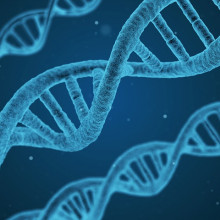
Is it possible to test your own DNA?
Kerstin Goepfrich and the team discussed the possibilities of home DNA sequencing.. Kerstin - It depends a bit on why you would want to test your DNA. Is it did you want to find out about your ancestors, is it that you want to be a detective and find out about your health or your potential risk of getting a certain disease, or do you really want to get your hands dirty and try your hands as a DNA scientist?
DNA is the molecule that stores the information of life and it does that by storing the information in the sequence of the genetic alphabet. So the DNA is made up of bases A, T, C, and G and the sequence of these bases is what stores the information. So the way to obtain the most information from DNA is literally reading the bases, reading the letters of the genetic code, and this is what we call DNA sequencing.
And, unfortunately this cannot be done at home yet. Even though just two weeks back on the programme we heard that there are now portable DNA sequencers. However, getting one of those for yourself is probably not possible yet - it might be in the future.
Chris - But there are companies who will allow you, if you collect a swab, to send it to them. and they will send you back some information about your genetic makeup, and that's a sort of home kit for the home collection. But what you're saying, Kerstin, is that probably, at the moment, for the domestic market, the physical reading of DNA sequences is a bit beyond the average person's reach?
Kerstin - Even though DNA sequencing has developed at unprecedented speed, it's still something that takes a while and takes proper laboratory equipment.
Chris - Giles..
Giles - So those home testing kits that you can actually buy from 23andMe and DNAfit, the interesting thing about those is they give you some interesting pieces of information. Certainly genealogy, where you come from, ancestry, that is very, very good. The problem is not in actually generating the pieces of genetic information, which is now robust and cheap, it's actually interpreting it. And I think interpreting it has become a problem because we are now beginning to misunderstand the fundamental difference between risk and prediction. And I think although these are very good in saying broad things, say if you have this versus that you will increase your risk of something. Can you pluck anybody off the street and try and predict if this person is going to become fat, is going to breath better, that is more difficult to do.
Chris - Someone else we had on the programme two or three years ago, Anna Middleton from the Wellcome Trust, she made me think because she came and said well look, a lot of people are getting their DNA sequenced and the NHS in England is going to be sequencing a hundred thousand people imminently. And that means that a hundred thousand people, or more, are going to start learning things about their genetic cargo which immediately tells them a lot about their parents and a lot about their siblings, which neither may wish to know about. They might value that information, they may not want to know that information but the minute you know something about your own genetic makeup, you know something about your relative. Which you previously wouldn't have done
Giles - Exactly.
Giles - That's exactly right. So I think there is a whole lot of ethics questions that are actually wrapped up in it which no-one is discussing, or not enough. That it's been outpaced by the technological ability to actually look at your DNA material, certainly for the prices now available.
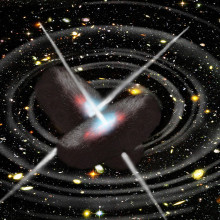
Can we make use of quantum entanglement to find out what actually happens inside a black hole?
Andrew Pontzen had the answer to Sreejith's question...
Andrew - Quantum entanglement is one of the most beautiful and bizarre phenomena in all of physics quite frankly. It comes from this world of quantum physics that we've been discussing quite a lot already on the programme, the physics of the very small. And it's this phenomenon where, seemingly, what you do to one tiny little chunk of matter, one tiny particle, in one place can instantaneously change how another particle in a completely different place is behaving. And when I say instantaneously, bizarrely, I actually mean instantaneously.
We have a kind of idea in physics that nothing can go faster than the speed of light, but there's no way that one part of the universe could influence another part of the universe without there having been time for some light at least to get from point A to point B. This seems to break that idea.
So it's actually a very sensible question to say - okay, sure, if I drop something into a black hole I'll never see it again, at least not in the form that I dropped it in. But could I use this bizarre effect of quantum entanglement to find out something about what's happened to it?
Chris - Is this what they dubbed "spooky action at a distance?"
Andrew - Yeah. It's not just they, it's Einstein that dubbed it "spooky action at a distance," because he hated it. It's so weird, it's so cutting against the grain of everything else we know about in physics.
Chris - But Niels Bohr said "if you're not baffled by quantum you didn't understand it."
Andrew - Absolutely. And I think that's a very fair way of putting it. However, what we do know about this phenomenon of quantum entanglement is you cannot actually use it to transmit information faster than the speed of light, which seems to contradict what I just said. So although one chunk of stuff can influence another chunk of stuff at a great distance seemingly fast than the speed of light, that can't be used to transmit a message.
So suppose I gave you one half of my entangled pair of particles and you tried to use it to transmit me a message.
Chris - You shared your quantum entangled mascara with me?
Andrew - Absolutely. I would only share it with you Chris.
Chris - I'm touched.
Andrew - Suppose we did that. Suppose you tried to figure out how can I send Andrew a message. Unfortunately, it turns out that there's actually a mathematical theorem showing you cannot use this effect to send me a message. If you can send me a beam of light at the same time, then you can kind of boost the amount of information that gets sent. But because the way that one of the pair affects the other is extremely subtle, it can't straightforwardly be used to send a message as you would with say a beam of light.
So if you can't put things in contact with a beam of light, you also can't put them in contact with quantum entanglement. So the answer is no.
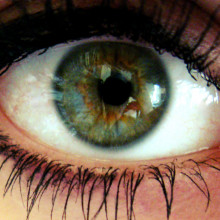
Why isn't love blinding?
Roger Buckley blinded us with science to answer Steve's question... Roger - Well it's quite true the number of emotional situations, including sexual attraction, can cause the pupils to dilate, but the effect is temporary and it's much less than having your pupils dilated by the optometrists. Also, any bright light will quickly reverse the effect which is not the case if you've had drops.
Chris - Right. So when you do find someone attractive your eyes do dilate, but that effect is trumped by bright light.
Roger - Exactly.
Chris - If you want to see whether someone really does fancy you, what your saying is you need to go and date them in a dark area?
Roger - I didn't say that at all. but it's a reasonable proposition.
- Previous Antidote to Silent Killer
- Next Does deforestation drive disease?










Comments
Add a comment